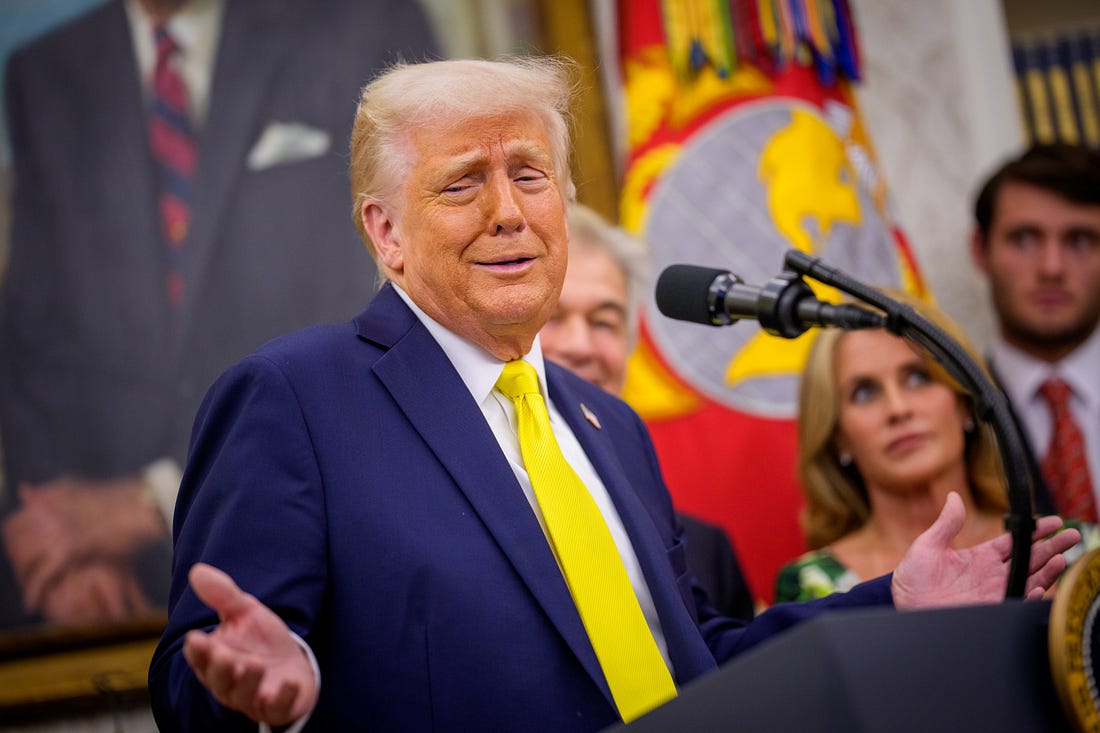|
 |
Why 2025 Trump (Sorta, Kinda) Achieved What 2017 Trump Couldn’t
The GOP strategy emphasized speed and stealth—and absolute loyalty to the president.
ONE OF THE MORE STARTLING REVELATIONS about Donald Trump’s push to pass his “big, beautiful bill” came from a meeting he held with some House Republicans on July 2.
The purpose of the meeting was to shore up support among moderate and swing-district Republicans feeling skittish about the legislation’s massive spending cuts. To ease their anxieties, NOTUS reported, Trump reaffirmed his commitment not to touch Medicaid.
Some of the House Republicans evidently found this unnerving, and understandably so, given that the emerging legislation included roughly a trillion dollars in Medicaid cuts. “But we’re touching Medicaid in this bill,” one House Republican reportedly told Trump.
Neither the NOTUS article nor a subsequent report in the Washington Post revealed Trump’s response, leaving open the question of whether he did not know how to answer the criticism or simply did not know what the GOP bill would actually do.
Normally, the possibility that a president could be so ill-prepared to defend his signature legislation would seem difficult to fathom. But it’s entirely in character for Trump, and something that’s been seen before.
In 2017, when he was lobbying GOP lawmakers to pass a bill that would have repealed the Affordable Care Act and radically restructured Medicaid, Trump eschewed substantive appeals and rarely—if ever—showed even cursory knowledge of health policy. He just kept telling Republicans he was counting on them to deliver a political win.
Back then, he didn’t get his wish. This time around, he did. And while this legislation does not do the damage that most of the 2017 repeal initiatives would have—Obamacare’s basic architecture is still standing, among other things—it still represents the largest cut to federal health care programs in history.
So what changed? And how much should Trump’s success alter our preconceptions of what effective leadership looks like?
These questions have been on the mind of many people who were around for both efforts, and that includes me. Many of the factors contributing to the collapse of the Republicans’ Obamacare-repeal efforts in 2017—as I reported in my book The Ten Year War—were again at play in this latest effort. These included not just Trump’s refusal to engage on substance, but also congressional leadership’s failure to work out factional differences beforehand, and an extremely rushed legislative process. Quite obviously those issues weren’t enough to prevent success this time.
But would-be reformers of health care tend to learn from past failures. It was true of the LBJ-era Democrats who created Medicare by taking lessons from Harry Truman’s doomed national health insurance initiative. And it was true of Obama-era Democrats, whose singular purpose in designing the Affordable Care Act was to avoid the mistakes of Bill Clinton’s ill-fated universal coverage attempt in the 1990s.
Now it looks like Trump-era Republicans have done something similar. They have learned from their past mistakes—or, at least, they have managed to avoid them—although it’s difficult to know to what extent they were adapting intentionally, and to what extent Trump’s chaotic approach to governing happened to work in their favor this time.
THE STORY OF HOW REPUBLICANS enacted such sweeping health care cuts in 2025 should probably start with something they did in 2024—or, more precisely, with something they didn’t do. They didn’t talk about health care.
Neither Trump nor GOP candidates further down the ballot mentioned the subject regularly during the campaign.¹ And when they couldn’t avoid the topic entirely—say, because they got a voter question about it—they’d typically respond with bland platitudes about the importance of making medical care cheaper.
The signs of greater ambitions were there, though, and they were not especially hard to spot for anybody paying attention. Project 2025 sketched out some of the health care cuts that would end up in the GOP legislation; Trump himself sent out a handful of social media posts indicating he remained interested in attacking Obamacare. But warnings that health care for millions was at risk in the 2024 election mostly generated eye rolls from the media and political establishments, especially when those warnings came from Kamala Harris.
Things were rather different in the 2016 campaign, when Trump talked constantly about repealing Obamacare, frequently starting off campaign rallies with a pledge to get it done. And while Hillary Clinton’s warnings sometimes provoked the same kinds of dismissals that Harris’s did eight years later, Trump put to rest any doubts about his intentions just days after the election, when he and congressional leaders announced that repeal would be their top legislative priority for the new year.
Even then, Republican leaders had some sense (though perhaps not enough) that the full scope of their agenda would alienate a lot of voters, especially those who had come to rely on the Affordable Care Act or Medicaid for health insurance. That’s why they dispensed with the months-long committee process that you would expect for s
